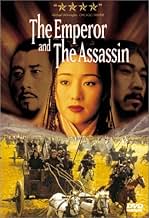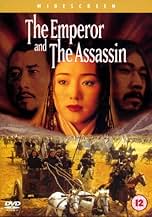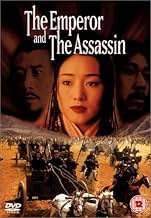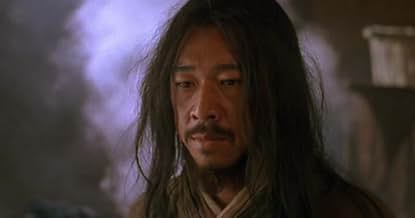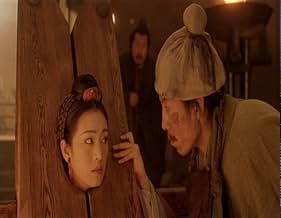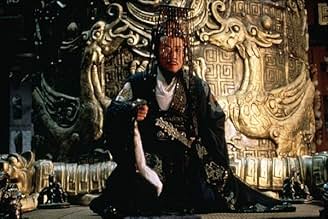NOTE IMDb
7,2/10
6,5 k
MA NOTE
Dans la Chine pré-unifiée, le roi de Qin envoie sa concubine dans un royaume rival afin de produire un assassin pour un complot politique, mais à mesure que la cruauté du roi augmente, sa lo... Tout lireDans la Chine pré-unifiée, le roi de Qin envoie sa concubine dans un royaume rival afin de produire un assassin pour un complot politique, mais à mesure que la cruauté du roi augmente, sa loyauté vacille.Dans la Chine pré-unifiée, le roi de Qin envoie sa concubine dans un royaume rival afin de produire un assassin pour un complot politique, mais à mesure que la cruauté du roi augmente, sa loyauté vacille.
- Récompenses
- 7 victoires et 11 nominations au total
Histoire
Le saviez-vous
- AnecdotesThe Xianyang palace was reconstructed in its entirety in the city of Dongyang in Zhenjiang province. Much of the film, including the final scene, was shot there. It is now being preserved as a theme park drawing large numbers of tourists. In addition, the capital cities of the other kingdoms featured in the film, Yan Zhao and Han, were constructed as several sights across China. All have been meticulously built to scale with special attention paid to their historical accuracy.
- Versions alternativesFirst cut was deemed regime-critic by chinese censors and therefore rejected. Approximately 30 minutes were cut to make a more regime-friendly version.
Commentaire à la une
For a feature film, the plot closely follows history--or at least historical gossip. But then the Chinese, who know the story very well from seeing it portrayed again and again, would never tolerate it otherwise. The attention to detail is wonderful, especially for anyone who has read Sima Qian's account in the Records of the Historian. Jing Ke, according to Sima Qian, did indeed make an attempt on Qin Shi Huang's life at the request of the Crown Prince of Yan before unification. Sima Qian explicitly mentions both the head of General Fan and the dagger rolled up into the map, as well as the dagger being thrown into the brass column. Although Jing Ke is described as no stranger to swordplay, he's hardly the invincible warrior portrayed by Chen Kaige. Jing Ke is indeed this film's weakest link. In reality (again, according to Sima Qian), he was a heavy drinker and put off his visit to Qin for as long as possible, spending a good deal of time with the ladies of Yan before the crown prince finally ordered him on his way. He was, in short, a human being and was not looking forward to death although he was willing to accept it. Chen Kaige's Jing Ke is afraid of death, but not his own. He is the classic ruthless killer turned disillusioned pacifist. His love (or maybe just affection) for a woman and pity for several hundred children whom Zheng had buried alive (not even two thousand years of hostile Confucian historians claimed Qin Shi Huang did this, although there is a legend about him burying 460 Confucians up to their necks and then beheading them)is enough to make this former assassin kill again. The melodrama is not convincing and the character ends up being just plain boring. The acting here isn't shabby, though not very interesting given the character. As for Lady Zhou, in all the numerous stories I've heard about Qin Shi Huang, she's never come up. Anyway, Gong Li is famous enough for Americans to have heard of her (thanks to Zhang Yimou) and there needed to be a love interest, so here she is. It's unfortunate that her performance is almost as wooden as Jing Ke's character. She's done much better (in Qiu Ju for example) at being subtle; here she just barely manages presence. But all of this is trivial compared to the extraordinary acting of Li Xuejian as Zheng himself. Qin Shi Huang is for the Chinese rather what Milton's Satan is for us: accepted as a villain, but a noble one. Qin Shi Huang's accomplishments radiate an awe all the way across two thousand years into the present and Li captures his frightening will without compromising his humanity. Li's performance is enough, but the scope of the film is grand although the photography is purposely drab. It does feel ancient. The score is adequate, scarcely moving though very appropriate to the action. Though I've only seen it once, I believe that Chen Kaige should be given more credit for his camera work than other reviewers have allowed him. The opening credits are exhilarating. If five stars its absolutely average, I given three more for Li Xuejian's acting and Chen Kaige as an actor, writer, and director.
Meilleurs choix
Connectez-vous pour évaluer et suivre la liste de favoris afin de recevoir des recommandations personnalisées
Détails
- Date de sortie
- Pays d’origine
- Sites officiels
- Langue
- Aussi connu sous le nom de
- The Emperor and the Assassin
- Sociétés de production
- Voir plus de crédits d'entreprise sur IMDbPro
Box-office
- Budget
- 15 000 000 $US (estimé)
- Montant brut aux États-Unis et au Canada
- 1 267 239 $US
- Week-end de sortie aux États-Unis et au Canada
- 47 295 $US
- 19 déc. 1999
- Montant brut mondial
- 1 267 239 $US
- Durée2 heures 42 minutes
- Couleur
- Mixage
- Rapport de forme
- 1.85 : 1
Contribuer à cette page
Suggérer une modification ou ajouter du contenu manquant

Lacune principale
By what name was L'empereur et l'assassin (1998) officially released in India in English?
Répondre

